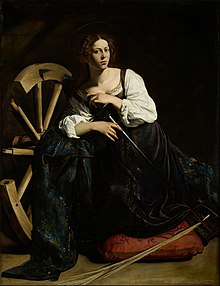Catherine of Alexandria, also spelled Katherine[a] (Greek: Αίκατερίνη) is, according to tradition, a Christian saint and virgin, who was martyred in the early 4th century at the hands of the emperor Maxentius. According to her hagiography, she was both a princess and a noted scholar who became a Christian around age 14, converted hundreds of people to Christianity, and was martyred around age 18. More than 1,100 years after Catherine's martyrdom, Joan of Arc identified her as one of the saints who appeared to and counselled her.[3]
The Eastern Orthodox Church venerates her as a great martyr and celebrates her feast day on 24 or 25 November, depending on the regional tradition. In Catholicism, Catherine is traditionally revered as one of the Fourteen Holy Helpers, and she is commemorated in the Roman Martyrology on 25 November.[4] Her feast was removed from the General Roman Calendar[5] in 1969 but restored in 2002 as an optional memorial.
Some modern scholars consider that the legend of Catherine was probably based on the life and murder of the virgin Saint Dorothea of Alexandria and the Greek philosopher Hypatia, with the reversed role of a Christian and neoplatonist in the case of the latter.[6][7][8] On the other hand, Leon Clugnet writing in the Catholic Encyclopedia states "although contemporary hagiographers look upon the authenticity of the various texts containing the legend of St. Catherine as more than doubtful, it is not therefore meant to cast even the shadow of a doubt around the existence of the saint".[9]
- ^ Cite error: The named reference
orthodoxwas invoked but never defined (see the help page). - ^ "Wednesday of the Thirty-Fourth Week of Ordinary Time; Optional Memorial of St. Catherine of Alexandria, virgin and martyr – November 25, 2020 – Liturgical Calendar". www.catholicculture.org.
- ^ Williard Trask, Joan of Arc: In Her Own Words (Turtle Point Press, 1996), 99
- ^ Martyrologium Romanum (Libreria Editrice Vaticana, 2001 ISBN 88-209-7210-7)
- ^ Calendarium Romanum (Libreria Editrice Vaticana, 1969), p. 147
- ^ Walsh 2007, pp. 3–26.
- ^ Deakin 2007, pp. 135, 202.
- ^ Maria Dzielska: Hypatia of Alexandria, Cambridge (Massachusetts) 1995, p. 21; Christian Lacombrade: Hypatia. In: Reallexikon für Antike und Christentum, Bd. 16, Stuttgart 1994, Sp. 956–967, here: 966; Gustave Bardy: Catherine d'Alexandrie. In: Dictionnaire d'histoire et de géographie ecclésiastiques, Bd. 11, Paris 1949, Sp. 1503–1505, here: 1504.
- ^ Clugnet 1908.
Cite error: There are <ref group=lower-alpha> tags or {{efn}} templates on this page, but the references will not show without a {{reflist|group=lower-alpha}} template or {{notelist}} template (see the help page).
